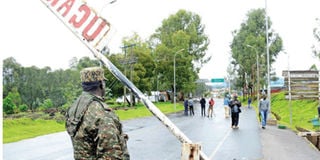Feuds hurt Rwanda’s cross-border trade

Affected trade. Border blockades between Rwanda and Uganda and Burundi have affected Kigali’s cross-border trade falling by at least 40 per cent. FILE PHOTO
What you need to know:
Growth. Rwanda’s Non-traditional exports, according to the country’s central bank, such as milled products and other manufactured goods registered a 25.2 per cent growth, earning the country up to $196.4m of the $577.8 recorded in the first half of the year.
Feuds between Rwanda and its neighbours have led to a sharp decline in informal cross-border trade, with the country’s central bank figures indicating an 8.1 per cent drop in exports, while imports fell by 40 per cent in the first half of 2019 compared to the same period last year.
Informal exports account for 10 per cent of the total share of Rwanda’s exports while informal imports account for 0.5 per cent.
For years, informal cross-border trade has been a source of livelihood for the border communities.
However, the escalation of political tensions between Kampala and Kigali, for instance, which led to Rwanda closing its borders with Uganda, locking out citizens from crossing, greatly affected trade along the border.
Rwanda and Burundi impasse
An earlier impasse between Rwanda and Burundi also affected informal and formal cross-border trade between the two countries, especially after Bujumbura blocked its traders from selling groceries to Rwanda.
Rwanda’s total informal exports in 2018 stood at $125.3m. Exports to other East African Community member countries, which accounts for 22.3 per cent of its total exports, however rose by 141.0 per cent in value, fetching $128.9m in the first half of 2019.
Imports from the region, however, dropped by 7.8 per cent, attributed to the increased participation of local businesses that had to step up to fill the gap for consumer goods from Uganda and Burundi. “People are slowly getting used to goods manufactured here. We can’t get Mukwano soap anymore, so they complain about the quality but when there are no options they end up buying what is available,” said a wholesaler in Kigali.
But the crisis has narrowed Rwanda’s trade deficit with the EAC to $99.8m in the first half of 2019, from $194.5m recorded last year. The figures also indicate that the country’s efforts to diversify exports is beginning to bear fruit after it recorded a 7.5 per cent growth in exports in the first half of 2019, largely driven by a surge in non-traditional exports at a time when traditional exports such as coffee, tea and minerals declined due to weakening global demand.



